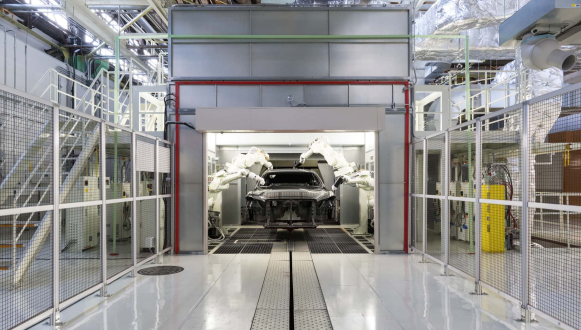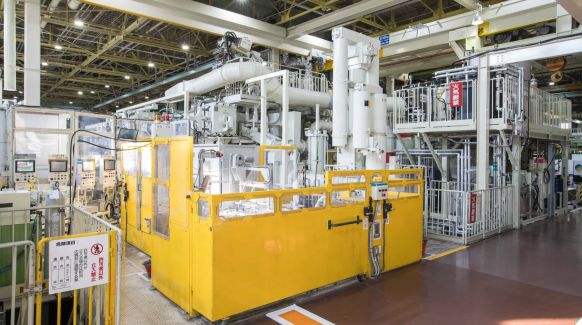 Technology peripherals
Technology peripherals
 It Industry
It Industry
 Toyota electric vehicles move towards revolutionary breakthrough: Solid-state battery R&D plan exposed
Toyota electric vehicles move towards revolutionary breakthrough: Solid-state battery R&D plan exposed
Toyota electric vehicles move towards revolutionary breakthrough: Solid-state battery R&D plan exposed
News on September 20, Toyota Motor recently unveiled its latest generation battery electric vehicle production line and a series of eye-catching new technologies in Japan. The moves are seen as a sign that Toyota is entering a new era of electric vehicle manufacturing as it aims to catch up with its U.S. and European rivals in the EV race.

One of the highlights of the new production line is Gigabit casting technology, which was announced at the Miaozhi factory in June 2023. Giga Casting uses large, single castings to create the vehicle's major structural components to reduce weight, improve structural integrity and simplify the manufacturing process. According to Toyota, they have extensive knowledge in molds, especially low-pressure molding and die casting. The introduction of this technology will significantly reduce mold change time from the original 24 hours to only 20 minutes.
Toyota plans to improve the quality of castings and reduce the number of defective products by applying proprietary analytical technology. In addition, Toyota will adopt EV's new modular structure and automated production methods, which will account for half of the entire production process. The company also plans to make major investments in its factory in Motomachi, Aichi Prefecture, to build a new production line
According to the editor’s understanding, Toyota also released the development route and timetable for solid-state batteries. Currently, Toyota is in a critical stage of solid-state battery development. They have successfully developed a solid-state battery that can enable electric vehicles to travel 745 miles and be fully charged in just 10 minutes. The company aims to bring the technology to market between 2027 and 2028

Under the leadership of CEO Koji Sato, Toyota plans to launch it in 2026 10 new electric cars, aiming to sell 1.5 million electric cars a year. The plan also includes the launch of a three-row electric SUV, which will be assembled at a plant in Georgetown, Kentucky, USA. In addition, Toyota plans to invest an additional $2.1 billion in a battery plant in North Carolina. These moves show Toyota's aggressive efforts to take a leading position in the electric vehicle market
The above is the detailed content of Toyota electric vehicles move towards revolutionary breakthrough: Solid-state battery R&D plan exposed. For more information, please follow other related articles on the PHP Chinese website!

Hot AI Tools

Undresser.AI Undress
AI-powered app for creating realistic nude photos

AI Clothes Remover
Online AI tool for removing clothes from photos.

Undress AI Tool
Undress images for free

Clothoff.io
AI clothes remover

Video Face Swap
Swap faces in any video effortlessly with our completely free AI face swap tool!

Hot Article

Hot Tools

Notepad++7.3.1
Easy-to-use and free code editor

SublimeText3 Chinese version
Chinese version, very easy to use

Zend Studio 13.0.1
Powerful PHP integrated development environment

Dreamweaver CS6
Visual web development tools

SublimeText3 Mac version
God-level code editing software (SublimeText3)

Hot Topics
 1392
1392
 52
52
 Panasonic will mass-produce all-solid-state batteries for drones, claiming to charge 80% in 3 minutes
Sep 21, 2023 pm 08:21 PM
Panasonic will mass-produce all-solid-state batteries for drones, claiming to charge 80% in 3 minutes
Sep 21, 2023 pm 08:21 PM
Panasonic Holdings announced on September 12 that it plans to start mass production of small all-solid-state batteries currently being developed for applications such as drones in the second half of the 2020s (that is, 2025 to 2029). According to the Nikkei Shimbun, Panasonic Holdings said that if it can be put into practical use, it is expected to be able to charge 80% of the drone battery capacity in about 3 minutes. Compared with existing lithium-ion batteries that take about an hour to charge, convenience will be greatly improved. Panasonic Holdings disclosed its technology demonstration to the media and customer companies for the first time and introduced all-solid-state batteries. Although details such as the composition of the metal material have not been announced, officials say it is expected to be able to charge and discharge tens of thousands of times, which will far exceed the approximately 3,000 times of charge and discharge of ordinary lithium-ion batteries. All-solid-state batteries as a new generation of vehicle battery backup
 Ganfeng Lithium Industry realizes mass production of first-generation solid-state batteries with energy density exceeding 260Wh/kg
May 24, 2023 am 08:16 AM
Ganfeng Lithium Industry realizes mass production of first-generation solid-state batteries with energy density exceeding 260Wh/kg
May 24, 2023 am 08:16 AM
According to news on May 22, Ganfeng Lithium Industry (GFLithium) has achieved a number of important breakthroughs in the battery field. According to the company's disclosure, they have successfully achieved mass production of first-generation solid-state batteries, and the safety performance of second-generation solid-state batteries fully meets the requirements of the automotive industry. This news was announced during the question and answer session of Ganfeng Lithium’s performance briefing held on May 19. Ganfeng Lithium is the world's largest lithium metal producer and the largest domestic supplier of lithium compounds. It is also one of the only companies in the world with industrialized technologies for "lithium extraction from brine", "lithium extraction from ore" and "lithium recovery from recycling" . The company has built a production line with approximately 120,000 tons of LCE (lithium carbonate) lithium salt production capacity by 2022, and its 10,000-ton lithium salt factory has become the world's largest lithium salt production base
 Japan's TDK Company claims to have made breakthrough progress in solid-state batteries, and the battery life of small electronic devices is expected to be significantly improved
Jun 19, 2024 am 05:36 AM
Japan's TDK Company claims to have made breakthrough progress in solid-state batteries, and the battery life of small electronic devices is expected to be significantly improved
Jun 19, 2024 am 05:36 AM
News from this website on June 17, according to the British Financial Times, Japan's TDK announced that it has made a breakthrough in materials used in small all-solid-state batteries, which is expected to significantly improve the performance of devices ranging from wireless headphones to smart watches. The energy density of this new material (i.e., the energy that can be stored in a specific space) reaches 1,000Wh/L, which is approximately 100 times that of TDK’s current mass-produced batteries. The Apple supplier has been advancing the development of small all-solid-state batteries since 2020, and its competitors currently have products that can provide an energy density of 50Wh/L, while the energy density of traditional liquid electrolyte rechargeable coin batteries is about 400Wh /L. We firmly believe that our newly developed all-solid-state battery materials can make a significant contribution to society's energy transition. we will continue to work hard
 What is a solid state battery
Dec 12, 2022 am 10:27 AM
What is a solid state battery
Dec 12, 2022 am 10:27 AM
A solid-state battery is a battery that uses solid electrodes and solid electrolytes; a solid-state battery means that there is no liquid at all inside the battery, and inorganic or organic polymer solids are used as the electrolyte of the battery. Solid-state lithium battery technology uses a glass compound made of lithium and sodium as a conductive material to replace the electrolyte of previous lithium batteries, greatly increasing the energy density of lithium batteries. Solid-state batteries have the advantages of good safety, high energy density, and strong cycle performance; the disadvantages are large impedance and high cost.
 Panasonic Holdings announces breakthrough in all-solid-state battery technology, significantly increasing drone charging speed
Sep 21, 2023 pm 03:45 PM
Panasonic Holdings announces breakthrough in all-solid-state battery technology, significantly increasing drone charging speed
Sep 21, 2023 pm 03:45 PM
On September 12, Panasonic Holdings announced an exciting technological breakthrough. They plan to start mass production of new small all-solid-state batteries in the second half of the 2020s. This news has attracted widespread attention in the industry, as this technology is expected to completely change the rules of the game in fields such as drones and electric vehicles. Panasonic Holdings said that their all-solid-state batteries have amazing charging speeds and are expected to only take 3 seconds. It takes about minutes to fully charge 80% of the drone's battery capacity. Charging speeds will be dozens of times faster than traditional lithium-ion batteries currently in use, meaning users will be able to put their drones into use more quickly without having to wait for long periods of time for charging to complete. In addition, Panasonic Holdings also claims that their all-solid-state batteries have extremely high charge
 American ION Company's new breakthrough in solid-state batteries: over 125 cycles, capacity attenuation less than 5%
Mar 07, 2024 pm 01:04 PM
American ION Company's new breakthrough in solid-state batteries: over 125 cycles, capacity attenuation less than 5%
Mar 07, 2024 pm 01:04 PM
According to news from this site on March 7, US battery start-up company ION Storage Systems (ION) recently announced that its Solid-State solid-state battery has successfully achieved more than 125 cycles with less than 5% performance and capacity attenuation, providing more than 1,000 cycles for future deployment. potential. According to reports, ION is a solid-state battery (SSB) manufacturer located in Maryland, USA. Its anode-free and compression-free solid-state battery SSB was deployed in the US military for the first time, thus reaching key customer and industry thresholds. ION has been working with the U.S. Department of Defense to test its SSB batteries before expanding into other markets such as electric vehicles, energy storage, consumer electronics and aerospace. ▲IONStorageS
 Mass production in 2025, Changan Automobile reveals latest solid-state battery plan
Dec 03, 2023 pm 08:34 PM
Mass production in 2025, Changan Automobile reveals latest solid-state battery plan
Dec 03, 2023 pm 08:34 PM
According to news on December 3, Changan Automobile recently revealed the latest progress of its solid-state battery plan in its latest investor relations activity record. Changan Automobile is currently actively developing new electrolyte materials for semi-solid batteries and solid-state batteries, as well as key processes. According to our understanding, the company plans to gradually promote the development of solid-state batteries based on vehicle demand, and plans to gradually mass-produce applications from 2025. According to the editor's understanding, Changan Automobile is committed to improving the weight and energy density of batteries in the research and development of solid-state batteries. It is expected to reach 350-500 Wh/kg, and the volume energy density is also expected to reach 750-1000 Wh/L. It is expected that this new type of battery will be fully popularized by 2030. In addition, Changan Automobile is also developing lithium-sulfur batteries.
 Samsung SDI demonstrates future battery technology: 9 minutes full charge, 20 years of use
Apr 25, 2024 pm 05:22 PM
Samsung SDI demonstrates future battery technology: 9 minutes full charge, 20 years of use
Apr 25, 2024 pm 05:22 PM
Samsung SDI demonstrated future battery technology for electric vehicles to global scholars at the 37th Electric Vehicle Symposium and Exhibition (EVS37). The Electric Vehicle Olympics is the world's largest electric vehicle seminar and exhibition. It started in 1969 and is a grand gathering of researchers from the global electric vehicle industry and academia. It is known as the "Electric Vehicle Olympics". This year is the third time that the conference is held in South Korea. The first two were in Busan in 2002 and in Goyang City, Gyeonggi Province in 2015. This year’s conference will be held at COEX in Gangnam-gu, Seoul and will last for four days. Samsung SDI participated in EVS for the second time since 2015, and the scale was twice that of the previous exhibition. It is reported that the three future-oriented electronic products displayed by Samsung SDI at this exhibition



